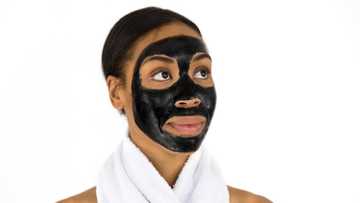Turmeric for face: uses, benefits, side effects
Turmeric is among the most popular spices on the planet today. This is attributable to its wide-ranging benefits to the body. The bright yellow spice has a mild, complementary taste that works perfectly with other spices and ingredients. Besides its consumption benefits, one can make use of turmeric for face problems. The anti-inflammatory and antibacterial properties of this spice make it the perfect remedy for problematic skin.

Source: Depositphotos
Curcumin is the main active compound in turmeric and gives it most of its skin-healing capabilities. Common skin issues that can be remedied with turmeric for face include uneven skin tone, pimples, dark spots and sores. This plant has been used as a skin care ingredient for decades.
Steps to take before using turmeric
- Do a small patch test on a small section of the skin before proceeding to widespread use. Some people have allergic reactions to this bright yellow spice. This condition is relatively rare, but you can never be too sure.
- Turmeric stains on the skin often fade away after a few days without requiring further action. Do not panic if the spice stains up your skin.
- You should exercise caution when handling turmeric. Yellow stains left on the skin will come off quickly. However, those left on clothes can prove rather challenging to remove.
- Ensure that you get the best quality herbs for topical application. If you can, go for the organically grown variety for all your turmeric uses.
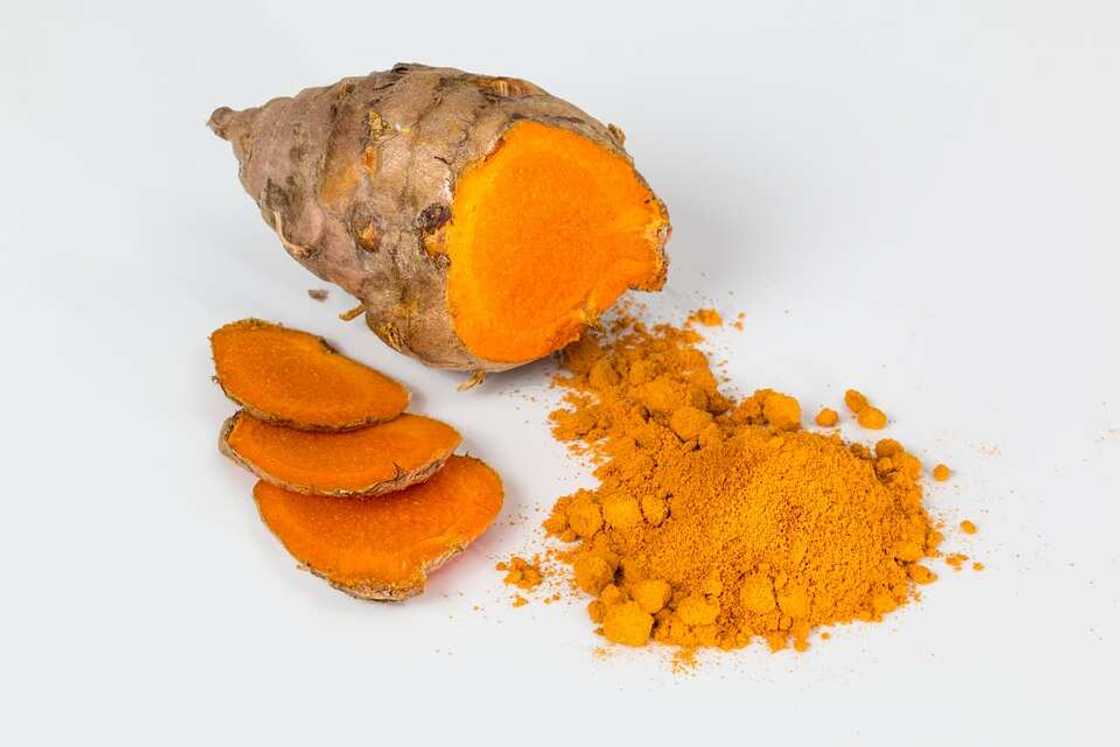
Source: UGC
Turmeric is best known as an ingredient for making curries and soups. The spice is a member of the larger ginger family and has a slight earthy scent. Besides its uses in the food industry, the spice has been used in Ayurvedic medicine for thousands of years. The potent skin-healing properties of curcumin, the active compound in turmeric, make the spice quite valuable in the medical field.
Top benefits of turmeric for face
- Facilitating rapid healing. Studies have proven that the bright yellow spice helps speed up the healing process in human beings.
- Remedying oily skin. Active compounds in turmeric help combat secretion of sebum, thus reducing the production of excess oil. This is among the most sought-after benefits of turmeric on the skin.
- Protection against sun damage. The spice has ingredients that help combat the harmful effects of UV rays, thus maintaining the skin’s youthful look.
- Anti-ageing effects. The spice has compounds that help combat the effects of fine lines, wrinkles and dark spots and help keep the skin looking ever young.
- Anti-cancer properties. Curcumin found in turmeric has been found to kill off cancer cells selectively while leaving healthy body cells intact. This makes the spice quite useful in the fight against cancer.
Top uses of turmeric
This bright yellow spice has numerous uses and benefits, especially when combined with other ingredients. Here are the best applications of turmeric for the skin.
Healing wounds
Turmeric has some proven antibacterial properties that help heal wounds. The anti-inflammatory and antiseptic nature of turmeric helps sooth wounded skin areas and reduce infection. Curcumin, the active compound in the spice modulates collagen and reduces reactive oxygen, thus facilitating rapid wound healing.
To achieve the perfect turmeric benefits, mix turmeric powder with coconut oil until it forms a paste. Apply this mixture on the wound three times a day to reduce inflammation and prevent further infection. You can also consume the powder mixed in warm milk once a day before sleeping.
Controlling oily skin
Excess oil on the skin can lead to numerous problems, including blackheads and irritations. The active compounds in the spice help reduce the skin’s sebum secretion, thus inhibiting the production of excess oil. Studies have shown significant turmeric benefits for the skin for people suffering from acne problems related to excessive oil production by the skin.
To control sebum secretion using the bright yellow spice, mix one teaspoon of turmeric powder with a spoon each of yoghurt and lemon juice. Mix this into a smooth paste and apply gently on your face until it forms a thick layer. Let this sit for thirty minutes before rinsing off with warm water. Repeat this procedure twice in a week. You can substitute yoghurt and lemon juice for gram flour and water.

Source: UGC
Psoriasis treatment
Psoriasis is a skin condition with symptoms such as redness, inflammation and pain. Curcumin, the active compound in turmeric has important genetic expression characteristics which help fight this skin condition. There is a study showing that turmeric can be helpful when used alongside traditional methods for treating psoriasis. The spice can also help in preventing certain types of psoriasis.
To discover the psoriasis-healing benefit of turmeric, mix the powder in water and mix until it forms a smooth paste. Apply this on the face until you achieve an even layer. Leave this overnight and rinse in the morning using warm water. Repeat this daily until the problem clears. If you are interested in learning how to take the spice, consume a glass of milk, honey and turmeric powder mixture twice a day for a few weeks.
READ ALSO: Turmeric face mask to lighten skin: does it work?
Delayed skin ageing effects
Curcumin has powerful anti-oxidant properties that protect the skin against the harmful effects of free radical damage. This reduces the visible signs of ageing such as wrinkles, fine lines, uneven tones and irregular dark spots. Besides regulating these effects, the spice also improves the general look of the skin due to its anti-inflammatory properties.

Source: UGC
To reduce the ageing effects of fine lines and wrinkles, mix a teaspoon of turmeric powder with yoghurt to form a smooth paste. Apply this on your face and let sit for twenty minutes before washing off with cold water. Repeat this twice a week.
Reducing the effects of burns
Active compounds in the spice have strong anti-inflammatory properties that help reduce the effects of pain caused by minor burns. The spice also decreases the possibilities of additional damage being caused to skin tissue. Studies have shown the spice to be a promising remedy for wounds resulting from burns.
To achieve the best results, apply a mixture of turmeric powder and milk on the wound and let it sit until it dries off. Rinse off the paste with cold water. Repeat this at least thrice a day until the wound is healed. You can also choose to prepare your cream for future using turmeric powder, Aloe Vera gel and coconut oil. Mix the ingredients mentioned above in a jar and place in a dark place for a week. The resulting product will be a potent home-made burn cream.
Treatment of Eczema
Eczema is an inflammatory skin problem that leads to red, itchy and dry skin. The anti-inflammatory properties of curcumin help reduce the effects of inflammation while its antimicrobial capabilities kill off any bacteria that would be causing Eczema and aid skin regeneration.
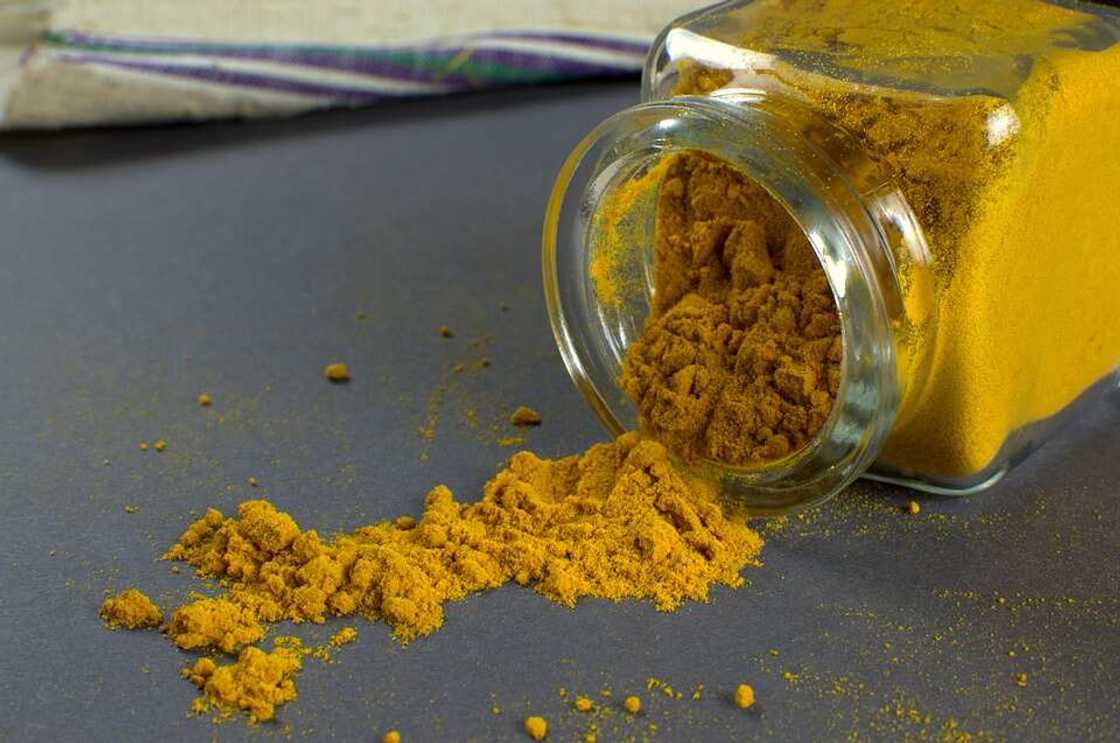
Source: UGC
To curb the effects of Eczema on the skin, apply a turmeric and milk paste on the face and let it dry on its own. Rinse off the skin with cold water and repeat this twice each day until the condition is gone. You can substitute coconut oil for milk if you prefer.
Curing acne
Pimples are probably the biggest facial problem today. Whether you are worried about a breakout or feeling uncomfortable from the resulting scars, turmeric is the perfect remedy for your face. The antibacterial properties of curcumin prevent the growth of bacteria on the skin, thus reducing the development of acne. The anti-inflammatory characteristics of the spice will also help soothe affected skin areas.
To use turmeric as an anti-acne remedy, mix an equal amount of honey and turmeric into a thick paste. Apply this mixture directly onto the affected area and let it sit overnight. Rinse the layer off in the morning. Use turmeric for face daily until the problem disappears. You can substitute sandalwood powder and milk for honey.
Sun damage control
Ultraviolet (UV) rays present in sunlight can cause serious harm to your skin, making it look dark and uneven. Turmeric has significant anti-ageing and skin brightening properties, thus making it the perfect solution for sun damage on the skin. A study on turmeric found that extracts of the spice helped prevent the formation of wrinkles brought about by UV rays. Additionally, the spice helps maintain skin elasticity and reduce the formation of dark spots.
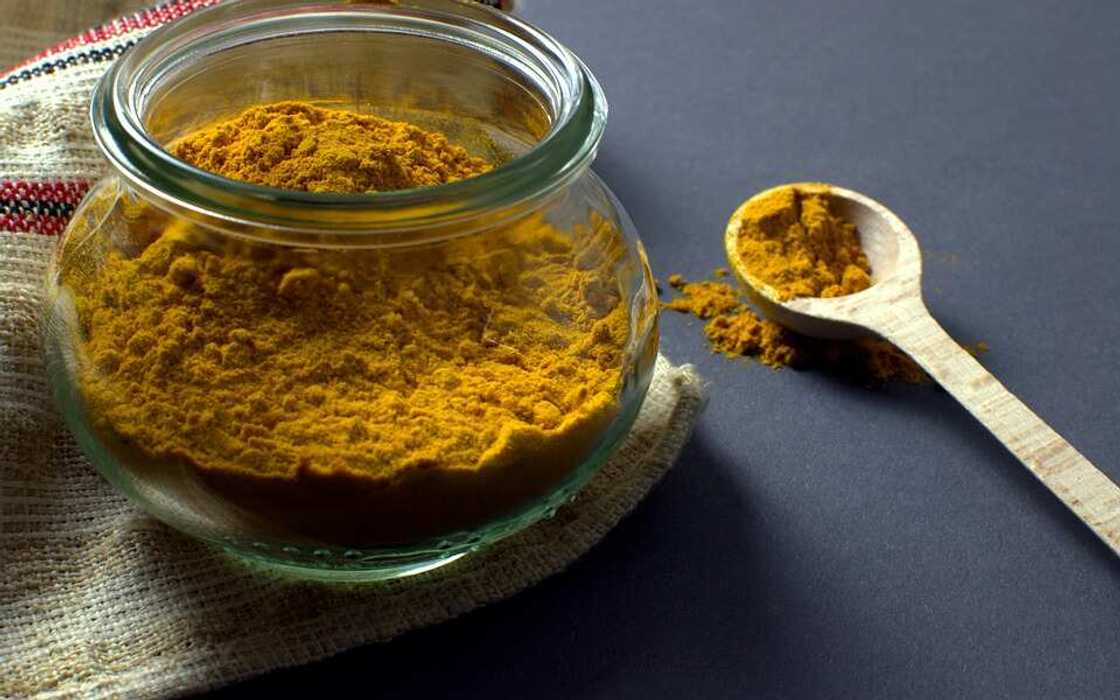
Source: UGC
To protect yourself from sun damage, mix an equal amount of sandalwood powder, turmeric powder and water and mix into a thick paste. Apply this mixture on the face and let it sit for half an hour. Rinse off with cold water and repeat twice a week for the perfect results.
READ ALSO: Facial treatment: steps, dos and dont's
Bright skin complexions
Anti-oxidant properties in curcumin help provide a natural glow to the skin while bringing out an even tone. The compound also reduces the effects of skin pigmentation, thus eliminating the formation of unsightly dark spots. To use the spice as a skin-lightening remedy, apply a mixture of turmeric powder, milk and honey on your face. Let this paste sit for thirty minutes and rinse off. Repeat this procedure thrice a week for the perfect results.
What are the side effects of turmeric?
When applied topically, there are little to no side effects of using turmeric on the face. The most common one is the formation of yellow stains on the skin. These usually fade away after a few days. However, when consumed, the spice may have various side effects that include:
- Increased contractions in the gall bladder. The significantly high levels of oxalate present in the spice are responsible for this effect.
- Increased bleeding. Studies have shown that the spice slows down the clotting process. This may have adverse effects on people with bleeding-related problems.
- Extreme lowering of blood pressure. While low blood pressure is ordinarily a good thing, it can become a problem when it gets to the extreme. The spice has been shown to lower blood pressure significantly.
- Diarrhoea and nausea. Curcumin – the active ingredient in turmeric – has been shown to cause irritations to the gastrointestinal system and may cause vomiting and diarrhoea.
You should consult a certified medical practitioner if you observe any of the symptoms mentioned above after consuming turmeric.
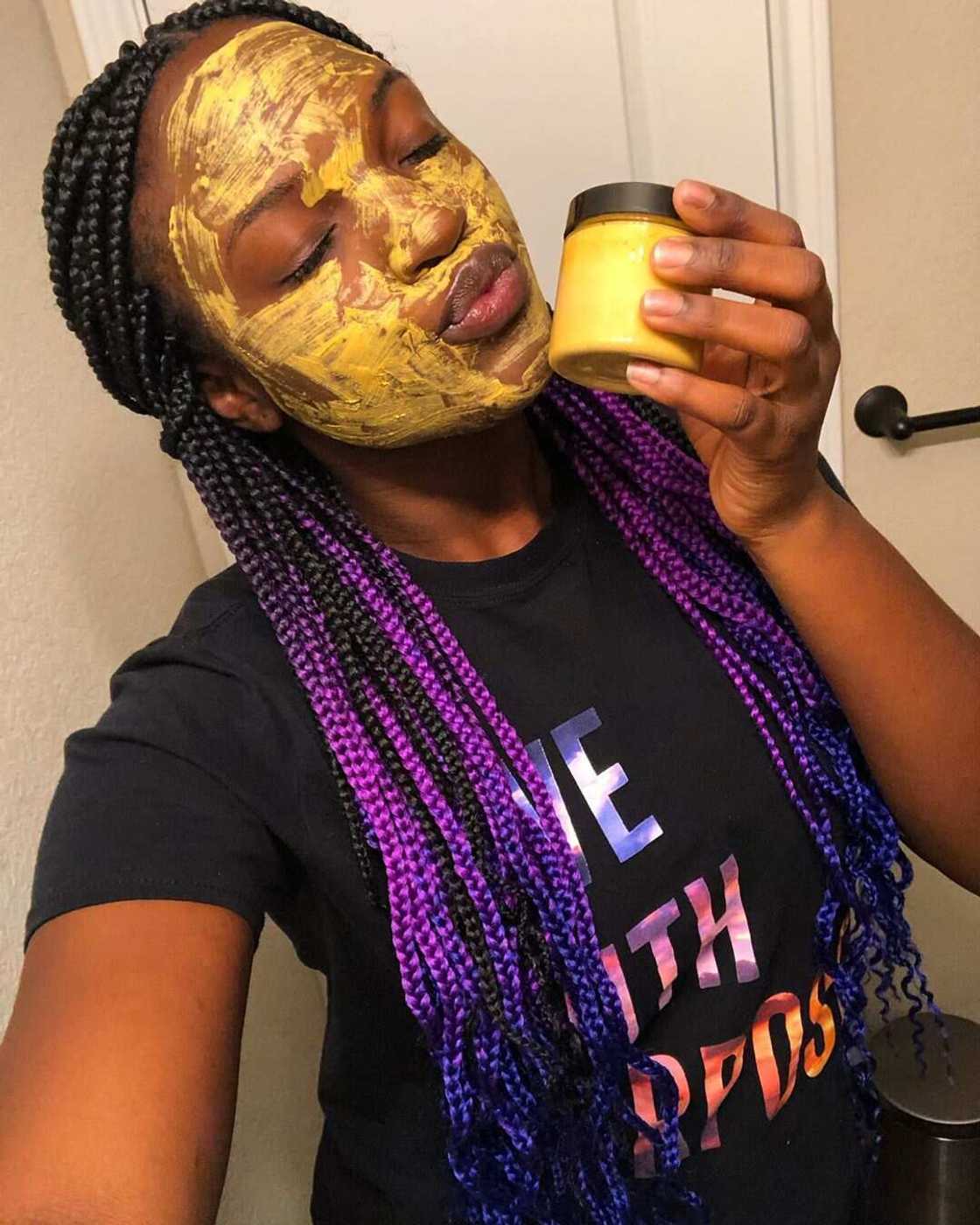
Source: UGC
As mentioned above, it is straightforward to make effective turmeric for face home remedies. The various medical properties found within the spice’s active compound are quite useful in solving numerous skin problems. The spice also has very few side effects, thus making it safe to use in most conditions. Try one of the methods mentioned in the guide and enjoy the fantastic results.
DISCLAIMER: The contents of this article are for purposes of general information only. Do not use this information to make decisions or substitute it for professional opinion or advice. You are responsible for the actions and decisions that will be taken based on the information provided in this article.
READ ALSO: How to use shea butter on face at night
Source: Legit.ng


